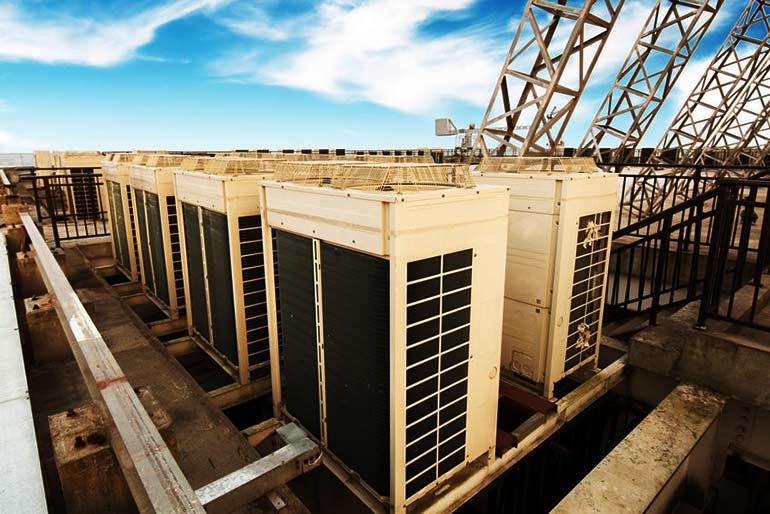Industry groups slam F-gas study
26th May 2021
BELGIUM: Leading associations from across Europe, the UK and Japan have expressed “strong concerns” at the content of the European Commission’s recent F-gas review study.
The study presented at the DG Clima stakeholder workshop on May 6 has already come in for criticism for its assertions of the degree to which “natural” refrigerants could replace HFCs in RACHP equipment.
The 15 associations, which include the Japanese Refrigeration and Air Conditioning Industry Association and the Japanese Business Council in Europe, object to the modelling approach taken by the consultants, Öko-Recherche, and believe that it does not provide the technical justification to support the proposed policy options.
The manufacturers’ association Eurovent has already branded the substitution scenarios as “unrealistic” and has expressed scepticism about the modelling assumptions employed. In particular, Eurovent takes issue with a scenario in the study that suggests hydrocarbon refrigerants could be used in up to 90% of small heat pumps as of 2025, and in all large split air conditioners and VRFs by 2030.
The Cooling Post, although not invited to take part in the workshop, previously reported that the study included proposals to ban the use of R410A in new stationary air conditioners and heat pumps. Now the industry groups have reacted.
In a scathing statement signed by the associations, including EPEE, AREA, the EHPA, ASERCOM and UK manufacturer’s group FETA, accuses the study of lacking detail in the modelling, having an unrealistic approach to certain refrigerants and technologies, lacking recognition of the significant abatement potential of heat pumps and a disregard for the competitiveness of European manufacturers.
Lacking definition
It criticises the detail in the substitution scenarios that the study presents. As an example, it says heat pumps and air conditioners are not clearly defined, and any specific reference to condensing units in commercial refrigeration is missing despite their specification in eco-design legislation.
The groups argue that refrigerant choice, lifetime assumptions, and other factors vary considerably depending on the application segments and that insufficient segmentation leads to premature and potentially misleading and unsubstantiated conclusions.
It also argues that all types of low global warming potential refrigerants are required in order to facilitate decarbonisation across sectors and takes issue with assumptions in the modelling.

In particular, the study’s claims that 80% of centrifugal chillers could be using “natural” refrigerants (CO2, hydrocarbons and ammonia) by 2025, 90% of small heat pumps using hydrocarbons by 2025, and all 100% large split a/c and VRFs on hydrocarbons by 2030, are described as “not realistic” – particularly as such products are not yet commercially available.
The study’s compilers are also accused of ignoring the crucial aspects of safety, energy efficiency, affordability as well as existing safety standards and building codes that restrict the use of flammable and toxic refrigerants across all air conditioning and heat pump applications.
“Energy efficiency should never be prejudiced, given that the major part of emissions are related to energy use (indirect emissions) rather than to the refrigerants (direct emissions),” the statement says.
Heat pumps ignored
The group also raises concerns that ignoring the contribution of heat pumps and air conditioners in terms of abating energy related CO2 emissions risks jeopardising the benefits of heat pumps on the path to decarbonisation with restrictive refrigerant related obligations.
Without drawing breath, the industry groups go on to accuse the study of being based on “very incomplete data” that does not consider such aspects as leakage reduction, recovery, recycling and reclamation. It is also said to ignore important considerations concerning safety standards and/or EU directives/regulations – like the General Product Safety Directive, Low Voltage Directive, ATEX Workplace Directive, Machinery Directive, Pressure Equipment Directive – and local and regional building codes or Ecodesign measures.
Manufacturers at a disadvantage
There are also concerns that adoption of such measures could hit the competitiveness of the European manufacturers in overseas markets.
“For the EU, in order to be a technology leader at global level, and to avoid a shift of production to outside of the EU, a level playing field and fair and equal treatment versus manufacturers outside the EU is a top priority,” the statement says. “However, as long as exported refrigerants in pre-charged equipment are not taken into account in the modelling and exempted from quota requirements in the EU, this cannot be the case.”
It also argues that the industry has developed new product platforms, based on the use of flammable refrigerants and is relying on the predictability of the existing F-Gas phase down.
“These efforts and the fact that these platforms will potentially not have the time to come to maturity in the market, have not been considered in terms of abatement costs, etc. It seems that the enormous effort undertaken by industry to deliver compliant products has not been taken into account at all, being considered as “negligible”.”
The statement is signed by ADC3R (the association of French refrigerant suppliers and reclaimers), AGORIA (formerly Fabrimetal, the Belgian association of metalworking companies), AFCE (the French cold climate alliance, APPLIA (the European home appliances association), AREA (the European contractors association), ASERCOM (the Association of European Refrigeration Component Manufacturers), EHI (representing the European Heating industry), EHPA (the European Heat Pump Association), EPEE (European Partnership for Energy and the Environment), Eurovent (Association for Indoor Climate (HVAC), Process Cooling, and Food Cold Chain Technologies), FETA (Federation of Environmental Trade Associations), FGK (the association representing the German air conditioning and ventilation industry), JBCE (Japanese Business Council in Europe) and JRAIA(Japanese Refrigeration and Air Conditioning Industry Association).
Related stories:
HC refrigerant adoption in European air conditioners “unrealistic” – 26 May 2021
BELGIUM: The European manufacturers’ group Eurovent has rejected as “completely unrealistic” claims by the European Commission that hydrocarbon refrigerants could replace HFCs in air conditioning systems by 2030. Read more…
F-gas review considers ban on R410A
BELGIUM: A ban on the use of R410A in new stationary air conditioners and heat pumps is being considered under the review of the European F-gas regulation (517/2014). Read more…







